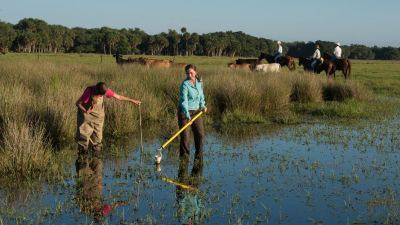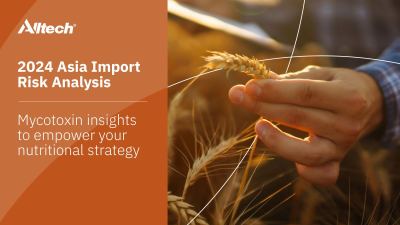Dr. Jeffrey Bewley: Get tech-savvy on your dairy

Technology has given dairy farmers access to huge amounts of data, but it takes skill to utilize this data to make operations more successful.
To improve profitability and meet consumer demands, farmers need to manage dairy cow comfort as well as intakes, body temperature, stress levels and additional aspects for each cow. Without precision dairy monitoring and real-time data, this is nearly impossible. Dr. Jeffrey Bewley, Alltech's dairy housing and analytics specialist, shares where technologies like robotic milking and sensors come into play.
The following is an edited transcript of Kara Keeton’s interview with Jeffrey Bewley. Click below to hear the full audio.
Kara: Dr. Jeffrey Bewley, Alltech's dairy housing and analytics specialist, is with me today to talk about the impact of technology on the dairy industry. Glad to have you today, Jeffrey.
Jeff: Glad to be here. Thank you.
Kara: I know your interest in the dairy industry grew from your involvement with your family's dairy operation in Kentucky. How did experiencing a traditional operation inspire your research today?
Jeff: In the end, what drives me is helping dairy farmers and helping improve the lives of dairy cows, and that was something that was instilled in me from a very young age on the dairy farm in Kentucky from my grandfather. He was actually quite a good dairy farmer and didn’t realize it at the time, but I learned a lot from him. I learned the importance of understanding records and data. From a way too young age, I was working with spreadsheets for the dairy farm, and that got me interested in data. I really guess I was probably born at the right time in that regard because, now, we have a data explosion. You hear about terms like big data and precision dairy and the internet of things, and here I am in the right place at the right time, because those are now very important parts of dairy operations and are going to continue to be more and more important because there's a massive opportunity with the amount of data that we have available to us now on dairy farms.
Kara: You mentioned precision dairy monitoring. What opportunities can that provide to dairy operators?
Jeff: Basically, when I refer to precision dairy monitoring, I'm talking about monitoring individual variables on the same animals across time. We might be looking at something behavioral — for example, a Fitbit for cows kind of an idea — or we might be looking at something within the milk or something physiological with the animal, or looking even with image analysis to look at the contour of the animal for something like how thin or how fat the animals are.
So, we're looking at these variables, trying to perform a management by exception approach. We're looking for animals that maybe are deviating from their normal behavior; that might indicate that it's time to take some kind of an action with that animal. For example, there might be an early indication that that animal is becoming sick. These technologies provide us an opportunity to monitor cows 24 hours a day. They're watching that animal, and they give us an early indication that something is going on. If we're able to detect something early, then the chances that we're going to have a successful intervention are higher, so, basically, it's all about making the lives of the animals better.
Kara: I love the idea of a Fitbit for dairy cows. How are farmers embracing this technology? We all know some are tentative to move to something new. In your work, your research and your work on the farms and with farmers, are they accepting this new technology? Are they seeing the benefits of this into their operation?
Jeff: They're generally fairly accepting of the technology. I think they see the value in it. They see the real-world stories, and they see the differences that the technology can make. The biggest issue, ultimately, probably comes down to cost. There's a cost involved, and the last few years have not been the strongest for milk prices, so it's been a little bit difficult in terms of adoptions, because people haven't had the extra capital to invest in those kinds of improvements. But for those that have had that or those that see that they need it to take them to the next level, they've been able to adopt that type of technology very readily and very successfully.
Kara: Those that are embracing technology, of course, still have to focus on the day-to-day operations. Is technology replacing the human factors in operation, or is it just enhancing their ability to run a successful dairy operation?
Jeff: It is definitely not replacing it. It may replace, in some cases, some of the monotonous tasks that are involved. For example, if we think about something like robotic milking, milking is pretty much a monotonous task, and robotic milking is able to do that, but in general, I would actually say that the use of technologies on dairy farms increases the need for people that really can understand cow behavior and can interpret what that information means. It increases the level of skill required.
So those that really understand animals and really can read beyond what the data might say are the ones that are going to benefit the most from the technologies. The people that use it as an easy way out are not going to be very successful. The analogy that I use a lot of times is, for example, if people want to lose weight, then it would be really nice if we could go down and take a pill and automatically lose weight. In reality, you still need to exercise and eat better, and I think that's the case with dairy farms too.
It's not an easy way out. We can't put a technology and, suddenly, things get better. You still need to be a good manager and know how to use and interpret that data.
Kara: You spoke of the automatic milkers on farms, and that technology is a time-saver and labor-saver for farmers. How are technologies impacting dairies across the world? Are we seeing, on a global scale, this technology embraced, or is it more in the U.S. and maybe Europe?
Jeff: There are definitely differences in the technology adoption around the world. I think, in general, Europe and Israel are the biggest adopters of technology. The United States is definitely behind in that regard. I think a lot of that has to do with labor costs. European labor costs are higher. That means that the technologies start looking economical sooner. Then, another factor is that a lot of our operations in the U.S. are larger, and some of the technologies, the economy as a scale, aren't quite there, so it still makes sense to do things with people instead of with technology, in that case. Also, I think the economic conditions in the last few years would have an impact, too.
Kara: With your work at Alltech and the research that you're doing here and around the world, what new technologies are on the horizon that will really change the way that dairy producers manage their animals in the future?
Jeff: I think it's really neat, what's coming on, in terms of being able to analyze variables within the milk, so there are a lot of biological parameters that we can pick up in the milk. The nice thing is we don’t have a variable cost associated with attaching something to every animal in the herd. We can use the same technology to monitor sometimes 10 or 15 different variables with the same technology.
The other place is in image analysis — so, being able to use the same technologies that are used in the human industry for looking at facial recognition or even the same kind of cameras that are used in the Xbox, for example, to look at something like how fat or how thin the animals are and measure that automatically, basically, just using geometry to do that, or being able to track the movement of the limbs as the cow walks, to be able to pick animals up that have feet and leg problems sooner, or being able to use that kind of technology to monitor feeding behavior and which cows are eating, how much time they're eating, and perhaps even eventually getting into how much that they're eating. These two areas, I think, are huge opportunities that we're going to see more and more technologies come out in the next decade.
Kara: While technology is being embraced by the dairy industry, it is still, in large part, a family-friendly industry. There are a lot of family dairies out there. As you work with different farms, what do you see as the changes in the operations? Are the families still seeing a future for the industry? Do you see it changing in another direction in the future?
Jeff: Well, one of the things that's particularly nice about robotic milking, for example, is that it takes away a task for a small dairy that really takes a lot of their time. With robotic milking, you can have one robot handle 50 or 60 cows, so it works very well for a small dairy and allows them to be able to not have to be tied down to three times a day when they're in the milking parlor with that monotonous task. Most people would argue that one of the biggest advantages of investing in a robotic milking system — particularly for a smaller dairy — is quality of life improvement. I think that technology has an opportunity to really improve the lives of small farms. Also, it's something that a lot of younger people really gravitate toward. In many cases, you hear stories where it's something that the next generation maybe wasn't that interested in being the dairy farmer and carrying on the family legacy until the robot came about, and then, that increased their level of interest to be able to continue that operation.
Kara: So, from the health of the animal, the production on the farm, operations and even the life of the family members, in the bottom line, the technologies in the dairy industry are all-around improving what they're seeing in their operations.
Jeff: They have a lot of potential for improving things at a lot of different levels. I think there's always a reality check that comes in that, sometimes, the data doesn’t do necessarily what it was supposed to do. You have to do something with the information that turns into a meaningful decision, and the economics of those technologies become very important also, so it's not necessarily magic, but I often say that the technologies don’t change the cows and they don’t change the people. They will change the way the two work together.
Kara: Well, thank you so much for your time today, Dr. Bewley, and we appreciate you coming.
Jeff: Thank you.
Kara: That was Dr. Jeffrey Bewley, Alltech's dairy housing and analytics specialist.















